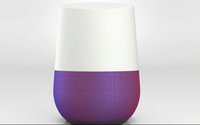 Consumers
are projected to spend six times more on wireless AI-powered personal assistants in 2020 than they did last year.
Consumers
are projected to spend six times more on wireless AI-powered personal assistants in 2020 than they did last year.
Google this week joined Amazon in the connected home and that might have an
overall positive effect on the market globally.
Consumer spending on smart home personal assistant devices like Amazon Echo and the just announced Google Home is projected to reach more than
$2 billion in the next four years, up from $350 million last year, according to recent research from Gartner.
Of those households, 75% will have one unit, 20% will have two and 5% will have
three or more, according to Gartner.
This shift from desktop and mobile to voice-controlled digital assistants in the home might also affect retail, according to Werner Goertz, research
director at Gartner.
advertisement
advertisement
"The widespread adoption and proliferation of VPA (Virtual Personal Assistant) speakers could result in a significant number of online shopping orders in the home being
initiated from a VPA speaker, rather than a laptop or mobile device," Goertz said in a statement.
"Vendors that are able to create an intimate, familiar relationship with the user will be able
to contextualize ordering to the extent that preferred products will be proposed, and processing details will already be captured.”
Agency executives already are exploring this type of
automated one-to-one communication through chat platforms and some see more
opportunities than others.
One point that has generally been raised when discussing voice-controlled personal assistants is that the value in these products ultimately is not in the
hardware, but rather in the services that the hardware can connect consumers to.
When discussing the future of brand experiences with the IoT Daily recently, HackerAgency’s Haydn
Sweterlitsch mentioned the idea that self-contained ecosystems are going to become less prominent in the future.
Sweterlitsch said ultimately the hardware, especially in the smart home
category, is going to level out to an expected standard of functionality and brands will differentiate themselves through their services.
“It’s going to be interesting as the
Internet of Things gains traction and more people gain more devices in their homes. We’re going to see it pull away from certain platforms,” Sweterlitsch told the Daily.
“What’s going to be the discernable difference between, say, the Amazon Echo and Google Home? It’s going to be the partnerships and services that they have.”
Amazon
has been working to expand support for third party services through its Alexa Skills Kit, as well as investing in better artificial intelligence for Alexa.
Google appears to be
doing the same, but somewhat inverted. The focus of most of Google’s recent launches has been in the power of the AI in the Google Assistant and Google said it plans to open the developer kit
for third-party integration next year.